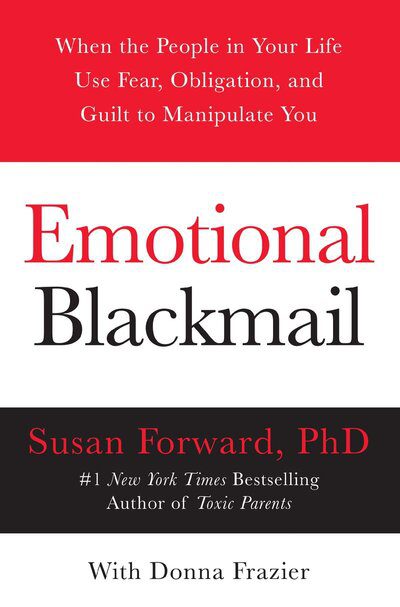In Emotional Blackmail, Therapist and Best Selling Author Susan Forward, Ph.D., presents the anatomy of a relationship damaged by manipulation and gives readers an arsenal of tools to fight back. Dr. Forward provides powerful, practical strategies for blackmail targets, including checklists, practice scenarios, and concrete communications techniques that will strengthen relationships and break the blackmail cycle for good.
Favourite Takeaways –Emotional Blackmail by Susan Forward
Skillful Manipulators
They swathe us in a comforting intimacy when they get what they want, but they frequently wind up threatening us in order to get their way, or burying us under a load of guilt and self-reproach when they don’t. It may seem as though they map out ways to get what they want from us, but often they’re not even aware of what they’re doing. In fact, many can appear sweet or long-suffering and not threatening at all.
Generally, it’s one particular person—a partner, a parent, a sibling, a friend—who manipulates us so consistently that we seem to forget everything we know about being effective adults. Though we may be skilled and successful in other parts of our lives, with these people we feel bewildered, powerless. They’ve got us wrapped around their little fingers.
“Just because there’s emotional blackmail in a close relationship doesn’t mean it’s doomed. It simply means that we need to honestly acknowledge and correct the behavior that’s causing us pain, putting these relationships back on a more solid foundation.“
WHAT IS EMOTIONAL BLACKMAIL?
Emotional blackmail is a powerful form of manipulation in which people close to us threaten, either directly or indirectly, to punish us if we don’t do what they want.
“At the heart of any kind of blackmail is one basic threat, which can be expressed in many different ways: If you don’t behave the way I want you to, you will suffer”
Emotional blackmail hits closer to home. Emotional blackmailers know how much we value our relationship with them. They know our vulnerabilities. Often they know our deepest secrets. And no matter how much they care about us, when they fear they won’t get their way, they use this intimate knowledge to shape the threats that give them the payoff they want: our compliance
Fear, Obligation and Guilt (FOG)
One key reason is that our blackmailers make it nearly impossible to see how they’re manipulating us because they lay down a thick fog that obscures their actions. We’d fight back if we could, but they ensure that we literally can’t see what is happening to us. A metaphor for the confusion blackmailers creates in us and as a lens for burning it off.
FOG is a shorthand way of referring to Fear, Obligation and Guilt, the tools of the blackmailer’s trade. Blackmailers pump an engulfing FOG into their relationships, ensuring that we will feel afraid to cross them, obligated to give them their way and terribly guilty if we don’t.
Blackmailers can skillfully mask the pressure they’re applying to us, and often we experience it in ways that make us question our perception of what’s happening.
FOG is penetrating, disorienting, and it obscures everything but the pounding discomfort it produces. In the midst of FOG we’re desperate to know: How did I get into this? How do I get out? How do I make these difficult feelings stop?
“The feelings and memories stored in our hot buttons can be searing, and when events in our current lives remind us of something we’ve kept buried inside, they can bring up reactions that override thought or logic, tapping pure emotion that has been stored and gaining power for a long time.”
Hot Buttons
Each of us brings into any relationship our own potent set of hot buttons—our stored-up resentments, regrets, insecurities, fears, angers. These are our soft spots, places that hurt when touched. Emotional blackmail can only operate when we let people know they’ve found our hot buttons and that we’ll jump when they push them.
Our compliance rewards the blackmailer, and every time we reward someone for a particular action, whether we realize it or not, we’re letting them know in the strongest possible terms that they can do it again.
The Price we pay
Many of the people who use emotional blackmail are friends, colleagues and family members with whom we have close ties that we want to preserve and strengthen. They may be people we love for the good times we’ve shared, the closeness we still occasionally manage to have and the histories we have in common. We may consider our relationships with them to be good, for the most part, but pulled off course by blackmail. It’s vital not to let the blackmail habit suck us—and everyone around us—into its vortex.
“When we live with emotional blackmail, it eats away at us and escalates until it puts our most important relationships and our whole sense of self-respect in jeopardy.
The six stages of emotional blackmail.
1: A demand
2: Resistance.
3: Pressure.
4: Threats.
5: Compliance
6: Repetition.
Manipulation
Manipulation becomes emotional blackmail when it is used repeatedly to coerce us into complying with the blackmailer’s demands, at the expense of our own wishes and well-being.
The Four Faces of Blackmail
“If you really loved me . . .”
“Don’t leave me or I’ll . . .”
“You’re the only one who can help me . . .”
“I could make things easy for you if you’d just . . .”
Blackmail Types
- Punishers, who let us know exactly what they want—and the consequences we’ll face if we don’t give it to them—are the most glaring. They may express themselves aggressively, or they may smoulder in silence, but either way, the anger they feel when thwarted is always aimed directly at us.
- Self-punishers, who occupy the second category, turn the threats inward, emphasizing what they’ll do to themselves if they don’t get their way.
- Sufferers are talented blamers and guilt-peddlers who often make us figure out what they want, and always conclude that it is up to us to ensure that they get it.
- Tantalizers put us through a series of tests and hold out a promise of something wonderful if we’ll just give them their way.
Fear
Blackmailers build their conscious and unconscious strategies on the information we give them about what we fear. They notice what we run away from, see what makes us nervous, observe when our bodies go rigid in response to something we’re experiencing. It’s not that they’re taking notes and actively filing them away for later use against us—we all absorb this knowledge about the people we’re close to. In emotional blackmail, fear works a transformation on the blackmailer, too
Fear moves us into black-and-white—even catastrophic—thinking.
OBLIGATION
We all come into our adult lives with well-established rules and values regarding how much of ourselves we owe to other people and how much of our behavior ought to be determined by such ideals as duty, obedience, loyalty, altruism and self-sacrifice. We all have deeply ingrained ideas about these values, and often we think they’re our own ideas, but actually they were shaped by the influence of our parents, our religious backgrounds, the prevailing beliefs of society, the media and the people we’re close to.
Most of us have a terrible time defining our boundaries, where our obligations to others begin and end. And when our sense of obligation is stronger than our sense of self-respect and self-caring, blackmailers quickly learn how to take advantage.
GUILT
Guilt is an essential part of being a feeling, responsible person. It’s a tool of the conscience that, in its undistorted form, registers discomfort and self-reproach if we’ve done something to violate our personal or social code of ethics. Guilt helps to keep our moral compass working, and because it feels so painful, it dominates our attention until we do something to relieve it. To avoid guilt, we try to avoid doing harm to someone else.
Emotional blackmailers encourage us to take global responsibility for their complaints and unhappiness, doing all they can to reprogram the basic and necessary mechanisms of appropriate guilt into an undeserved-guilt production line where the lights continually flash guilty, guilty, guilty.
Tools of the Trade”
Blackmailers are expert rationalizers, and they use their tools to persuade us that the blackmail somehow serves us.
THE SPIN
Blackmailers see our conflicts with them as reflections of how misguided and off-base we are, while they describe themselves as wise and well-intentioned. In the most simplistic terms, we’re the bad guys, and they’re the ones in the white hats.
Emotional Blackmailers are the original spin doctors, masters of putting a halo around their own character and motives and splattering ours with serious doubts, or even blacker mud.
PATHOLOGIZING
Blackmailers accuse us of being neurotic, warped, hysterical. And most wrenching, they dissolve the trust that’s accumulated in a relationship by lining up all the unhappy events we’ve shared with them and throwing them back in our faces to prove that we caused these things to happen because we were such emotional cripples.
“Pathology comes from the Greek word pathos, which refers to suffering or deep feeling, but the current connotation of the word is “disease.” Pathologizing is a way of making us appear “sick” when we don’t go along with a blackmailer.”
ENLISTING ALLIES
When single-handed attempts at blackmail aren’t effective, many emotional blackmailers call in the reinforcements. They bring in other people—family members, friends, ministers—to help make their case for them and to prove that they’re right. In this way, they double- or triple-team their targets. Blackmailers round up anyone they know the target cares about and respects, and faced with this solid front, the target may feel outnumbered, overpowered.
NEGATIVE COMPARISONS.
Negative comparisons make us feel suddenly deficient. We’re not as good, not as loyal, not as accomplished as so-and-so, and we feel anxious and guilty about it. So anxious, in fact, that we may be willing to give in to blackmailers to prove that they’re wrong about us.
IT’S NOT ABOUT YOU
The most important thing to take away from our tour of the blackmailer’s psyche is that emotional blackmail sounds like it’s all about you and feels like it’s all about you, but for the most part it’s not about you at all. Instead, it flows from and tries to stabilize some fairly insecure places inside the blackmailer. Much of the blaming, spin and self-righteousness that have made us feel so bad about ourselves—often bad enough to give in to the blackmailer’s pressure—is not valid. It’s fear-based. Anxiety-based. Insecurity-based. And those fears, anxieties and insecurities reside inside the blackmailer.
THE TRAITS THAT MAKE US VULNERABLE TO BLACKMAIL
To insulate ourselves against having our hot buttons activated, we develop a number of specific personality traits. They’re so much a part of us that it may not be apparent at first that they’re defenses against what we fear. They are:
- An excessive need for approval
- An intense fear of anger
- A need for peace at any price
- A tendency to take too much responsibility for other people’s lives
- A high level of self-doubt
The Atlas Syndrome
People with the Atlas syndrome believe that they alone must solve every problem, putting their own needs last. Like Atlas, who carried the world on his shoulders, they weigh themselves down with the burden of fixing everyone else’s feelings and actions, hoping to atone for past or future transgressions.
SELF-BLACKMAIL
Sometimes blackmail only takes one. We can easily stage every element of the blackmail drama alone—from request through resistance, pressure and threats, acting as both blackmailer and target. This happens when our fear of other people’s negative responses is strong, and our imagination takes over. We assume that if we ask for what we want, they’ll disapprove, withdraw, be angry, and we’re so adamant about protecting ourselves that we don’t let ourselves take any chances, even the minimal risk of asking the other person “How would you feel if I . . .”
Power statement: I CAN STAND IT
Those four words may look insignificant, but used correctly, they can become one of your most potent weapons for resisting emotional blackmail. They’re effective because they counter a belief that ushers us straight into saying yes to our blackmailers: the idea that we can’t stand the pressure.
SENDING UP AN SOS – Stop. Observe. Strategize
Just remember this convenient shorthand for the first three steps in the change process. SOS: Stop. Observe. Strategize.
STEP ONE: STOP
Well, the first thing you need to do is give yourself time to think—away from the pressure. To do this, you’ll need to learn some time-buying phrases that will slow things down. Some suggestions for your first response to whatever the demand happens to be:
- I don’t have an answer for you right now. I need some time to think.
- This is too important to decide quickly. Let me think about it.
- I’m not willing to make a decision right now.
- I’m not sure how I feel about what you’re asking. Let’s discuss this a little later.
Use time-buying statements as soon as a demand is made, and continue to repeat them if the blackmailer pressures you to make an immediate decision.
STEP TWO: BECOME AN OBSERVER
Once you’ve detached yourself from the blackmail drama, you’re in a position to gather the information that will help you decide how to respond to the blackmailer. During the time you have bought to make your decision, you’ll need to become an observer of both yourself and the other person.
Conscious Compliance
Conscious compliance is the yes you choose after thinking about what another person wants and after you have disabled the mechanisms of automatic compliance by observing and becoming aware of your thoughts, feelings and preferences. Used appropriately, conscious compliance can be the best way to achieve the results that are most important to you.
Strategize
STRATEGY 1: NONDEFENSIVE COMMUNICATION
As many startled blackmailers have discovered, without fuel from the target, the blackmail attempts that worked so well in the past fizzle.
In real life, with real people, emotions and interactions are complex, especially in a family; there are rarely Hollywood endings.
Actions, Not Words
Many emotional blackmailers find it easy to apologize and say they’ll make changes but much harder to deliver on their promises. It’s important to remind them with words such as “We had an agreement, and I’d really appreciate it if you kept your part of the bargain.
All the Best in your quest to get Better. Don’t Settle: Live with Passion.



4 Comments
Pingback: The Tyranny of Shoulds. – Lanre Dahunsi
Pingback: Setting Healthy Boundaries. – Lanre Dahunsi
Pingback: Fear, Obligation, and Guilt (FOG) – Lanre Dahunsi
Pingback: Top Quotes on Codependency. – Lanre Dahunsi